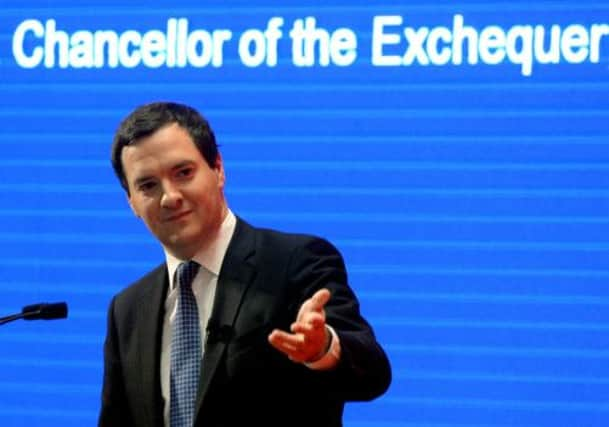Osborne set for deficit goal after borrowing dip


As tax receipts rose on the back of the housing market boom and wider economic recovery, the Office for National Statistics (ONS) said public sector net borrowing – excluding the distorting effects of bank bailouts – fell by £1 billion to £12.1bn last month. It follows August’s drop of almost £1.3bn.
However, the Chancellor insisted that the figures would not divert him from his austerity drive, because an improving economy on its own would not be enough to rein in the budget deficit.
Advertisement
Hide AdAdvertisement
Hide AdOsborne said: “An improving economic situation in the UK does not automatically lead to a windfall for the public finances because we shouldn’t assume that a structural deficit is solved by an improvement in GDP. It’s called a structural deficit for a reason.”
Howard Archer, chief UK and European economist at IHS Global Insight, said the pressure on Osborne to relax his spending cuts has fallen away because of the improved economic performance “and will likely only resurface should the economy suffer a marked relapse over the coming months”.
James Knightley, senior economist at ING Bank, said the figures were “fractionally better than expected” and there were hopes for further improvements as the economy continues to grow and London’s property boom contributes to the tax take from stamp duty, which surged 39 per cent to £817 million.
The independent Office for Budget Responsibility (OBR), set up to monitor the nation’s finances, has forecast that underlying public sector net borrowing will hit £119.8bn for the current financial year, but a number of economists now believe the annual deficit is more likely to come in at about £105bn.
Markit chief economist Chris Williamson said: “Strong economic growth is likely to persist in coming months, boosting the government’s tax take further, especially from corporation tax, which should more than keep the deficit on target.
“A figure of £105bn for the year is currently looking more likely than the government’s £120bn target, which was set at a time when the economy was showing signs of renewed weakness, in contrast to today’s picture of robust expansion.”
The Treasury said the economy was “turning a corner” but Labour claimed that – while the fall in monthly borrowing was welcome – the Chancellor looked set to borrow more than planned.
Monthly interest payments on the nation’s debt fell by 5 per cent but still cost taxpayers £2.8bn in September – out of total government expenditure that grew 2.5 per cent to reach £53.2bn for the month.
Advertisement
Hide AdAdvertisement
Hide AdThe return of part of the government’s stake in Lloyds Banking Group to private hands was recorded as a £586m profit, which will go towards paying down the state’s debt.
Martin Beck, of Capital Economics, said: “Although the economic recovery has taken its time to come though in the fiscal numbers, September’s figures suggest that the public finances are now beginning to reap the rewards of a stronger economy.”
However, the current net debt excluding bank bail-outs climbed to £1.21 trillion, reaching a new high of 75.9 per cent of UK GDP.